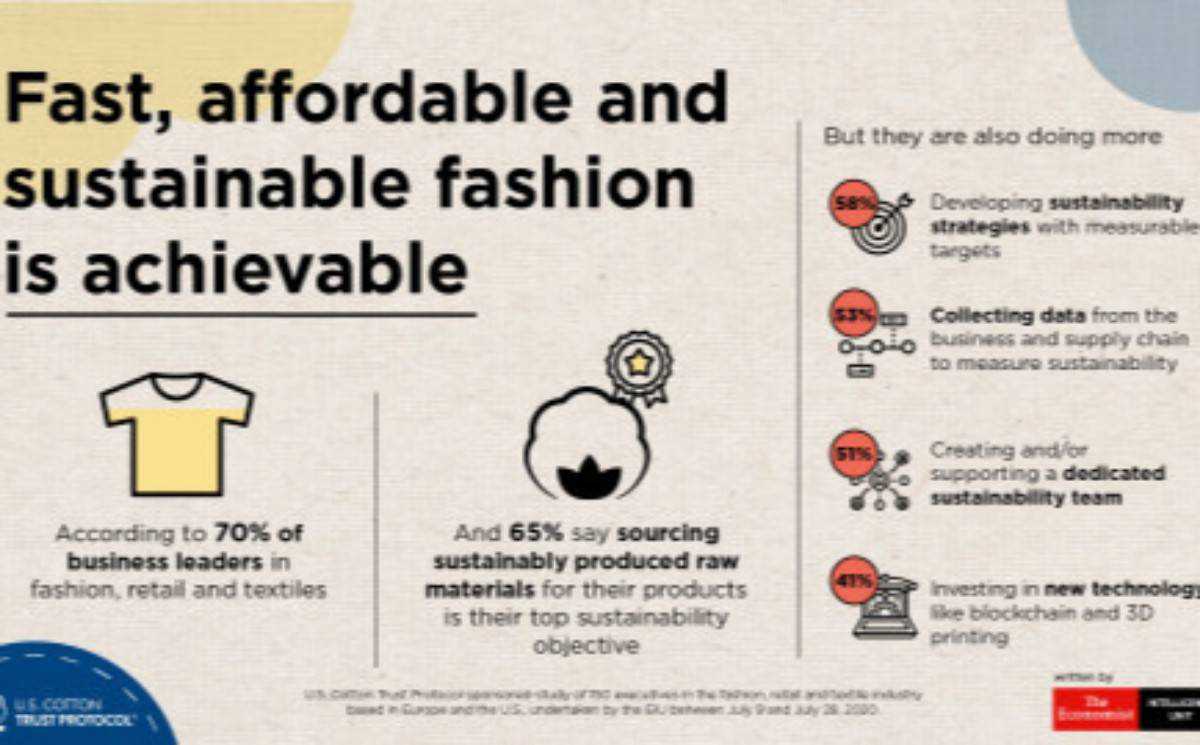60 percent of the style and textile industry are eager to go green
20 October, 2020

Regardless of the Covid-19 pandemic, new research reveals sustainability is still ranked as the second most significant strategic objective for businesses (60 percent) in the retail sector.
The main priority in the list was bettering customers’ experience (64 percent), while one in six listed ‘rewarding shareholders’ as the most notable objective.
That’s according to the US Cotton Trust Protocol and Economist Intelligence Unit (EIU), which surveyed 150 executives from trend, retail and textile businesses across Europe and the US.
The new research showed that leaders are introducing sustainability measures through the entire supply chain: 65 percent are sourcing sustainability produced materials, 51 percent are introducing a circular economy approach and cutting greenhouse gasses, and 41 percent are buying new technologies such as 3D printing and blockchain.
70 percent of leaders are confident that affordable, fast and sustainable fashion is achievable.
Data collecting crucial for sustainability
In terms of how companies are prioritising their sustainable approaches, 58 percent prioritised developing an environmental sustainability strategy with measurable targets as a way of implementing sustainability, while 53 percent considered data collection critical for sustainability.
Three in ten businesses explained that the option of reliable data holds the main element to a greater knowledge of sustainability over the next decade. Additionally, 73 percent of industry leaders stated that support for global benchmarks and thresholds work ways of measuring sustainability overall performance and progress in the market.
On the other hand, while businesses recognise the value of data on supplier sustainability methods (65 percent), and workers’ privileges and workplace health insurance and safety (62 percent), the study revealed too little data from businesses concerning sustainability sourcing.
45 percent of businesses do not track their greenhouse gas emissions across production, manufacturing and distribution of the products they sell, and 41 percent do not track the quantity of water and energy used to create the recycleables they source. 26 percent of respondents saw a lack of available and easily-accessible info as hindering sustainability progress across the industry.
Collaboration is required to drive change
The report also discovered that industry leaders require collaboration to make sustainable change, but when it comes to external support to help guide that progress, they don’t necessarily think further regulation may be the answer.
The UN Sustainable Development Goals and government regulation received equal weight of 24 percent to get businesses for traveling sustainable change, and 33 percent ranked regulatory requirements within the most notable three factors for helping guide the progress of sustainability.
Jonathan Birdwell, regional head of public policy and thought leadership at the EIU, said in a statement: “It’s clear from the survey effects and our interviews with business leaders that the industry is committed to driving progress on its sustainability performance. We were specifically struck by the fact that sustainability is generally considered as pre-competitive, behind the scenes brands are sharing means and lessons learned.”
Just over half of respondents in the survey said they thought the uncertainty of Covid-19 would make sustainability less of important within the industry.
Source: fashionunited.uk
